Publications
All publications
Read more about our learning from Farm Africa's programmes in our publications.
Filter by:
Country
Ethiopia
Key focus areas
Act on climate change
Increase incomes
Protect ecosystems
The Forests for Sustainable Development programme: stories of impact
This publication captures the progress of the Forests for Sustainable Development programme as it partners with communities in the ecologically critical Bale Eco-region of Ethiopia to balance local livelihood needs with the protection of globally significant natural forests. Alongside the impact summary is a collection of stories from the community and an overview of key lessons learnt along the way.
Download (2.86mb)
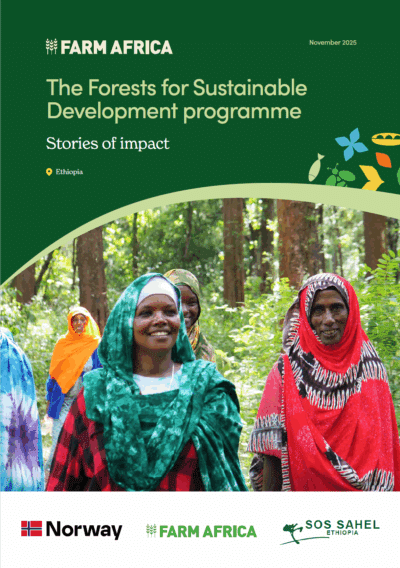
Country
Ethiopia
Key focus areas
Act on climate change
Increase incomes
Protect ecosystems
Country
Uganda
Key focus areas
Boost productivity
Increase food security and nutrition
Protect ecosystems
Maize production training manual
This maize production training manual will be used by Farm Africa Village-based Advisors and government extension workers to help improve maize crop management in Uganda. This revised version contains more photos to help farmers comprehend more about better maize farming techniques, as well as additions such as “Farm record keeping” to assist farmers manage their production costs and enhance their income.
Download (3.57mb)
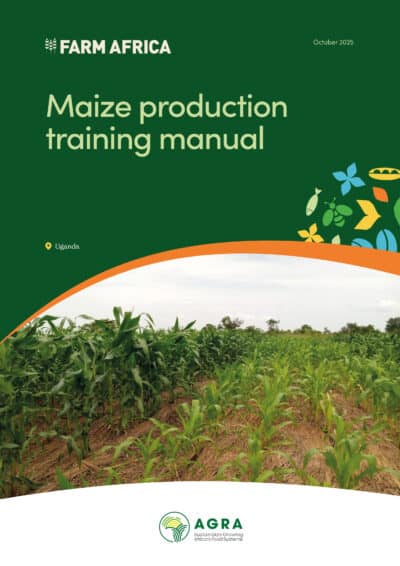
Country
Uganda
Key focus areas
Boost productivity
Increase food security and nutrition
Protect ecosystems
Country
Uganda
Key focus areas
Boost productivity
Increase food security and nutrition
Protect ecosystems
Rice production training manual
This is a revised “Rice Cultivation Handbook” for both upland and lowland rice cultivation techniques that will be used by Farm Africa Village-based Advisors to help improve rice crop management in Uganda. This version contains more photos to help farmers comprehend better rice cultivation techniques. The revised version also contains additions such as “Farm record keeping” to assist farmers in managing their production costs and enhancing their income.
Download (3.57mb)
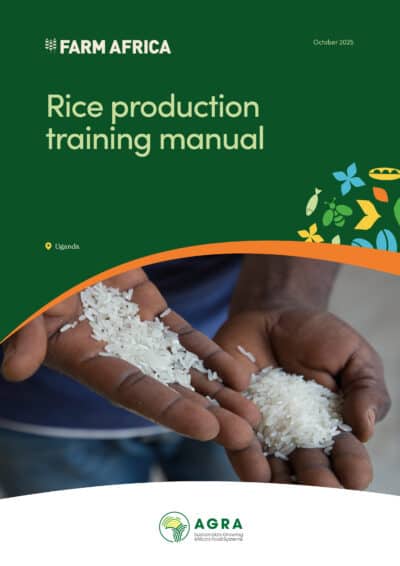
Country
Uganda
Key focus areas
Boost productivity
Increase food security and nutrition
Protect ecosystems
Country
Uganda
Key focus areas
Boost productivity
Increase food security and nutrition
Protect ecosystems
Beans production training manual
This beans production training manual will be used by Farm Africa Village-based Advisors and government extension workers to help improve beans crop management in Uganda. This version contains more photos to help our farmers comprehend more about better beans farming techniques. The revised version also contains additions such as “Farm record keeping” to assist farmers manage their production costs and enhance their income.
Download (5.47mb)
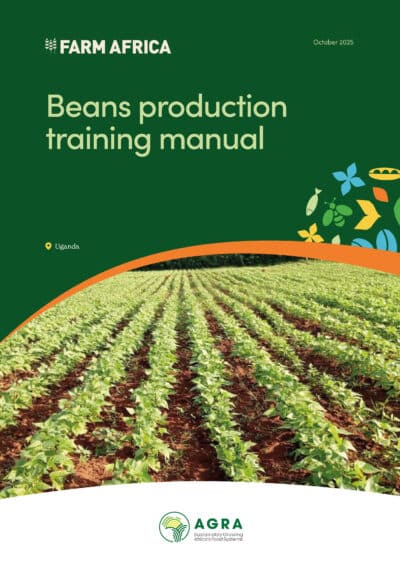
Country
Uganda
Key focus areas
Boost productivity
Increase food security and nutrition
Protect ecosystems
Country
Kenya
Key focus areas
Boost youth employment
Increase food security and nutrition
Increase incomes
Impact stories from the YISA programme quarter 3 2025
A collection of stories from June to August 2025 from the Youth in Sustainable Aquaculture, a partnership programme in Kenya with the Mastercard Foundation and consortium partners led by Farm Africa that aims to strengthen resilient livelihoods through innovative aquaculture practices, enabling work opportunities for young women and men.
Download (4.96mb)

Country
Kenya
Key focus areas
Boost youth employment
Increase food security and nutrition
Increase incomes
Country
Ethiopia
Key focus areas
Act on climate change
Increase incomes
Protect ecosystems
Strengthening Participatory Forest Management in Ethiopia
This policy brief outlines recommendations from Tree Aid and Farm Africa on how participatory forest management can be strengthened and scaled to protect Ethiopia’s forests.
Download (1.46mb)
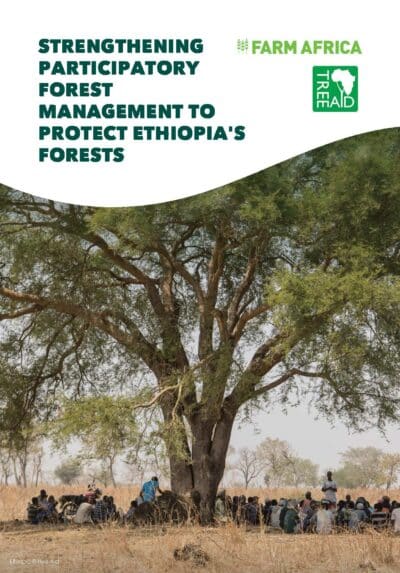
Country
Ethiopia
Key focus areas
Act on climate change
Increase incomes
Protect ecosystems
Country
Kenya
Key focus areas
Boost productivity
Connect farmers to markets
Protect ecosystems
Kenya projects overview 2025
Farm Africa supports small-scale farmers, women,and young people in Kenya to adopt sustainable, climate-resilient agriculture that protects livelihoods and natural resources.This overview summarises the projects Farm Africa is running across Kenya in 2025.
Download (2.99mb)
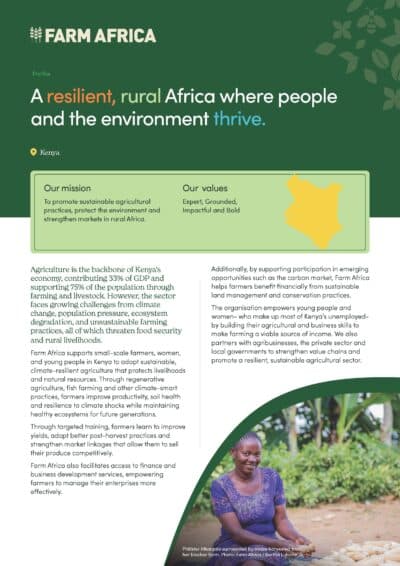
Country
Kenya
Key focus areas
Boost productivity
Connect farmers to markets
Protect ecosystems
Country
Kenya
Key focus areas
Act on climate change
Boost productivity
Increase incomes
SAVES project factsheet
With funding from AGRA, Farm Africa’s Sustainable agricultural value chain enterprises in central Kenya (SAVES) project is creating sustainable and inclusive agricultural systems that increase food security, incomes and climate resilience for smallholder farmers and broader rural communities in Meru, Kirinyaga and Laikipia counties.
Download (1.37mb)

Country
Kenya
Key focus areas
Act on climate change
Boost productivity
Increase incomes
Country
Kenya
Key focus areas
Act on climate change
Boost productivity
Protect ecosystems
Farm Africa regenerative agriculture evidence in Embu and Tharaka Nithi counties
This presentation outlines the evidence of the impact of the use of regenerative agricultural practices on soil’s health, microbial diversity, organic carbon and fertility; crop yields; income streams and tree density on farms in Embu and Tharaka Nithi counties in Kenya. The practices were adopted by farmers participating in Farm Africa and AGRA’s regenerative agriculture project.
Download (1.93mb)
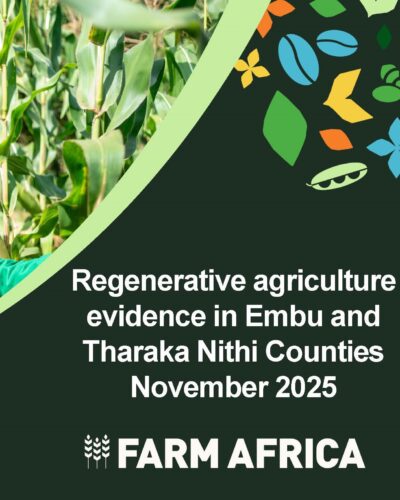
Country
Kenya
Key focus areas
Act on climate change
Boost productivity
Protect ecosystems
Country
Uganda
Key focus areas
Empower women
Increase food security and nutrition
Seeds of change: Focus on Karamoja
A collection of impact stories from Farm Africa’s work to boost food security and nutrition in Uganda.
Download (3.87mb)
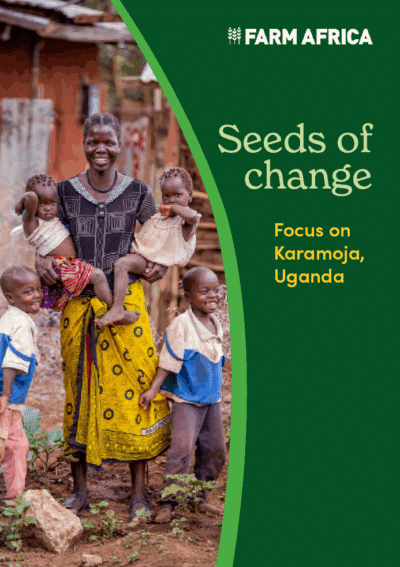
Country
Uganda
Key focus areas
Empower women
Increase food security and nutrition
Annual Report and Financial Statements 2024
Farm Africa Annual Report and Consolidated Financial Statements for the year ended 31 December 2024.
Download (2.91mb)
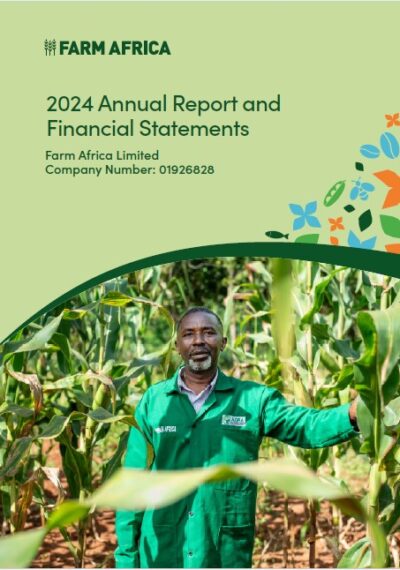
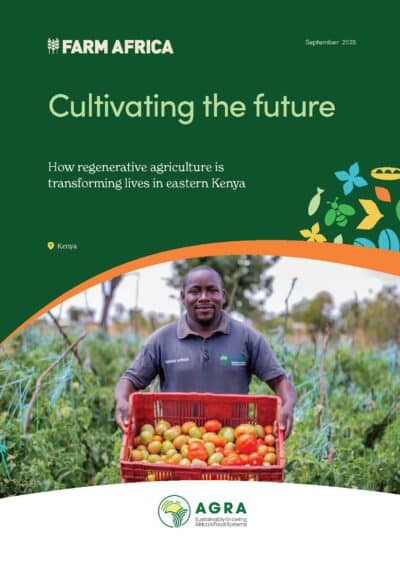
Cultivating the future – how regenerative agriculture is transforming lives in eastern Kenya
More info
Country
Kenya
Key focus areas
Boost productivity
Protect ecosystems
Strengthen food systems
Cultivating the future – how regenerative agriculture is transforming lives in eastern Kenya
Smallholder farmers across eastern Kenya are witnessing dramatic transformations in their yields, incomes and resilience to climate change, thanks to Farm Africa’s Strengthening Regenerative Agriculture in Kenya (STRAK) project. Funded by the IKEA Foundation through AGRA, the STRAK initiative is redefining sustainable farming in Embu and Tharaka Nithi counties. Over 50,000 farmers have been directly supported to adopt regenerative agricultural practices that restore soil health, conserve water and boost profits, all while safeguarding the environment.
Download (2.65mb)

Country
Kenya
Key focus areas
Boost productivity
Protect ecosystems
Strengthen food systems
Farm Africa Annual Review 2024
Farm Africa reached 771,221 people in 2024: 26% more than in 2023. In this year’s Annual Review, we invite you to meet some of the project participants we’ve been working with and learn how they are using sustainable farming to power lasting change for their communities.
Download (3.23mb)
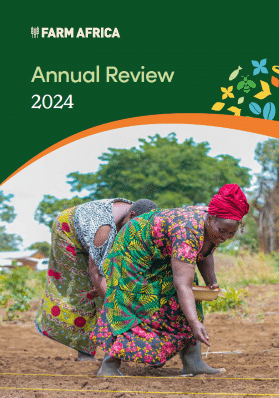
Country
Kenya
Key focus areas
Boost productivity
Boost youth employment
Increase incomes
Impact stories from the YISA programme
A collection of stories from the Youth in Sustainable Aquaculture, a partnership programme with the Mastercard Foundation and consortium partners led by Farm Africa that aims to strengthen resilient livelihoods through innovative aquaculture practices, enabling work opportunities for young women and men.
Download (3.33mb)
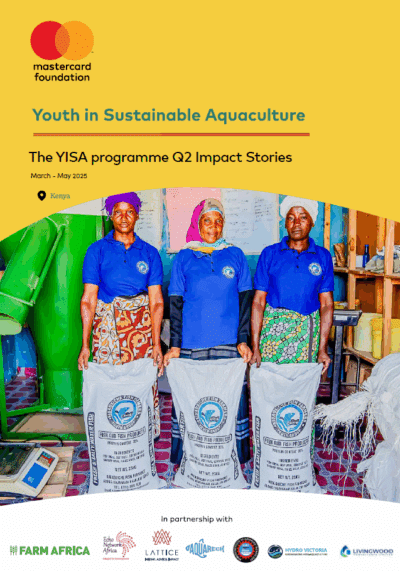
Country
Kenya
Key focus areas
Boost productivity
Boost youth employment
Increase incomes
Country
Regional
Key focus areas
Boost youth employment
Increase food security and nutrition
Increase incomes
Forty years of impact
To mark Farm Africa’s 40th year, past and present Farm Africa project participants share stories of the impact the charity has had on their lives.
Download (767.18kb)
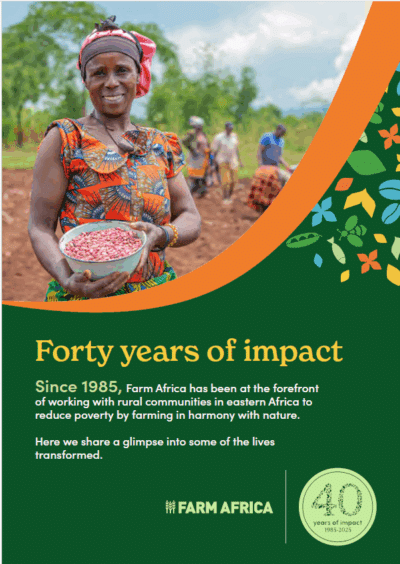
Country
Regional
Key focus areas
Boost youth employment
Increase food security and nutrition
Increase incomes
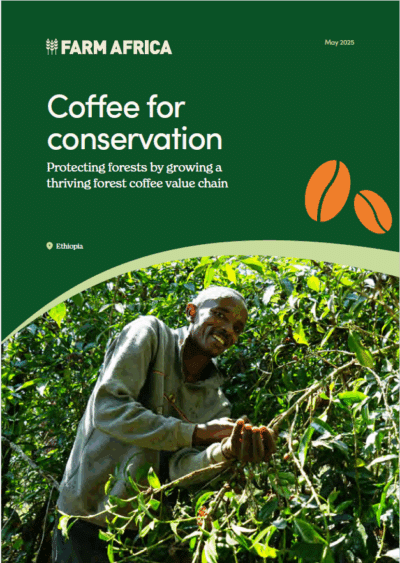
Coffee for conservation: Protecting forests by growing a thriving forest coffee value chain
More info
Country
Ethiopia
Key focus areas
Connect farmers to markets
Increase incomes
Protect ecosystems
Coffee for conservation: Protecting forests by growing a thriving forest coffee value chain
This learning paper describes how a three-year Farm Africa project in the ecologically vital Ilu Ababor Zone of Ethiopia successfully protected natural forests while improving the livelihoods of 4,000 people through sustainable coffee production and alternative income sources.
Download (1.04mb)

Country
Ethiopia
Key focus areas
Connect farmers to markets
Increase incomes
Protect ecosystems
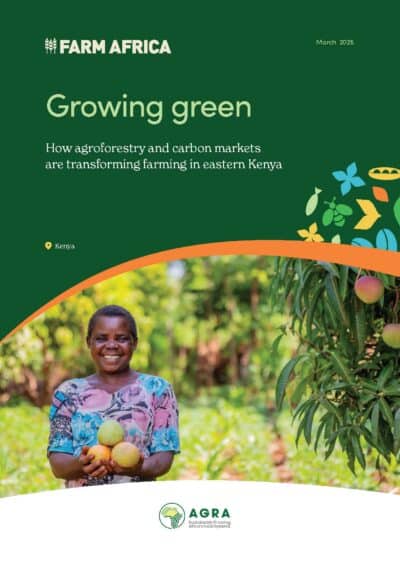
Growing green – how agroforestry and carbon markets are transforming farming in eastern Kenya
More info
Country
Kenya
Key focus areas
Act on climate change
Increase incomes
Protect ecosystems
Growing green – how agroforestry and carbon markets are transforming farming in eastern Kenya
This report charts the progress of more than 21,500 farmers in Embu and Tharaka Nithi counties in eastern Kenya who have planted trees and adopted climate-smart farming techniques.
Download (1.95mb)

Country
Kenya
Key focus areas
Act on climate change
Increase incomes
Protect ecosystems
Country
Kenya
Key focus areas
Empower women
Increase incomes
Strengthen food systems
Growing Resilience And Opportunities for Women (GROW) Roundtable Report
In October 2024, Farm Africa convened a roundtable discussion with female industry leaders in Nairobi, Kenya as part of its Growing Resilience and Opportunities for Women (GROW) initiative. This report summarises the key themes and conclusion of the discussion, which explored women’s role in the global food system and ways to drive positive change.
Download (2.16mb)
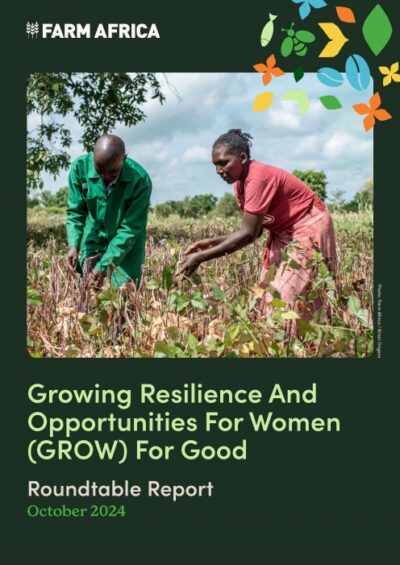
Country
Kenya
Key focus areas
Empower women
Increase incomes
Strengthen food systems

